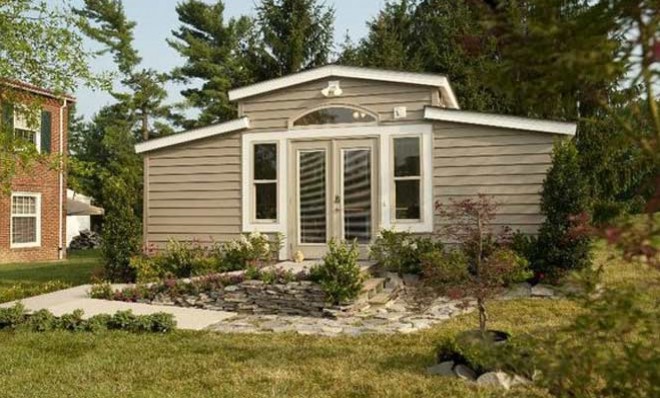'Granny pods': The future of elderly living?
A Virginia pastor thinks he has the perfect solution for the growing legions of independent-minded boomers too old to live on their own


A free daily email with the biggest news stories of the day – and the best features from TheWeek.com
You are now subscribed
Your newsletter sign-up was successful
If you're not among the 23 millions Americans already caring for your elderly parents, you probably will be soon, says Mary Fischer at The Stir. By 2030, when the baby boomers have all reached retirement age, there will be more than 72 million Americans 65 or older, according to the Census Bureau. But let's be honest: "It can be pretty tough to convince grandma to check into an assisted living center if she's used to being pretty independent, and the idea of moving her in with you may not go over so well and opens up the gate to a whole host of conflicts and problems." Enter the "granny pod," which promises to give you the best of both worlds: An independent living facility in your own backyard. Here's what you should know:
What are "granny pods"?
They are actually called MEDCottages, developed by Virginia startup N2Care. The 288-square-foot units (12 feet by 24 feet) are self-contained miniature houses that fit in most backyards, with a bedroom, kitchen, and bathroom. (Watch a video below.) What sets them apart from other portable, yard-friendly houses are what N2Care calls the "smart robotic features" that monitor the inhabitant's vital signs, filter contaminants from the air, and allow grandma to easily communicate with the main house. The name "granny pod" was coined by Fairfax County Supervisor Jeff McKay, who was skeptical of the idea. "Is it a good idea to throw people into a storage container and put them in your back yard?" he asked in 2010, when company founder Rev. Kenneth Dupin proposed the idea. Granny pod certainly "wasn't our name," Dupin says. "You don't get to choose your nickname."
The Week
Escape your echo chamber. Get the facts behind the news, plus analysis from multiple perspectives.

Sign up for The Week's Free Newsletters
From our morning news briefing to a weekly Good News Newsletter, get the best of The Week delivered directly to your inbox.
From our morning news briefing to a weekly Good News Newsletter, get the best of The Week delivered directly to your inbox.
What are granny pod's "robotic" amenities?
N2Care pitches the cottages as "state-of-the-art hospital rooms," and each one includes the lower-tech features you'd find in a nursing home or assisted living facility: Safety rails, lighted floorboards, a special floor designed to minimize damaging falls, a first aid kit, and a defibrillator. But there are also three video cameras, including a privacy-minded one at floor level that alerts the caregiver if the resident falls; a toilet seat that can report a person's weight, temperature, and urine content; computers that remind grandma to take her meds; and a hammock-like chair lift that can transport residents from the bedroom to the bathroom. The only problem, says The Stir's Fischer, is that with all the bells and whistles, "will grandma even be able to figure out how to turn the lights on and off?"
How much do these high-tech cottages cost?
They start at $85,000, but will set you back about $125,000 once installation is factored in. Nursing homes costs at least $50,000 a year, although Medicaid ends up picking up the tab for many residents.
A free daily email with the biggest news stories of the day – and the best features from TheWeek.com
Will granny pods take off?
Dupin thinks so. Americans value independence, and while is something we can't really say in public about our parents, "we don't want them in our house," Dupin says. "Nor do they want to be in our house." Besides, says Fischer at The Stir, "the possibilities with this thing go way beyond grandma": A place to house visiting in-laws, a rumpus room for adults, a quiet bed to escape a snoring spouse. "You have to admit, this is a pretty cool idea."
Is there any downside to these backyard dwellings?
"The issue is not demand, it's placement," and specifically zoning laws, Dupin says. Virginia passed a law specifically allowing the MEDCottages in backyards, but only with a doctor's prescription and only as long as the original resident lived there — though local officials say that will be difficult to enforce. "This basically sets up an opportunity to do something legally which, prior to this, had been illegal — which is to set up a second residence on a single-family property," says McKay, the county supervisor. That could be a problem in densely populated urban and suburban areas. If people hate their neighbors parking PODS in their driveway, says Fredrick Kunkle in The Washington Post, imagine how much they'd love permanent granny pods cluttering up the block.
Sources: CBS News, Daily Mail, Federal Long Term Care Insurance Program, Mashable, New York Daily News, NPR, The Stir, Washington Post
Peter has worked as a news and culture writer and editor at The Week since the site's launch in 2008. He covers politics, world affairs, religion and cultural currents. His journalism career began as a copy editor at a financial newswire and has included editorial positions at The New York Times Magazine, Facts on File, and Oregon State University.
-
 El Paso airspace closure tied to FAA-Pentagon standoff
El Paso airspace closure tied to FAA-Pentagon standoffSpeed Read The closure in the Texas border city stemmed from disagreements between the Federal Aviation Administration and Pentagon officials over drone-related tests
-
 Political cartoons for February 12
Political cartoons for February 12Cartoons Thursday's political cartoons include a Pam Bondi performance, Ghislaine Maxwell on tour, and ICE detention facilities
-
 Arcadia: Tom Stoppard’s ‘masterpiece’ makes a ‘triumphant’ return
Arcadia: Tom Stoppard’s ‘masterpiece’ makes a ‘triumphant’ returnThe Week Recommends Carrie Cracknell’s revival at the Old Vic ‘grips like a thriller’
